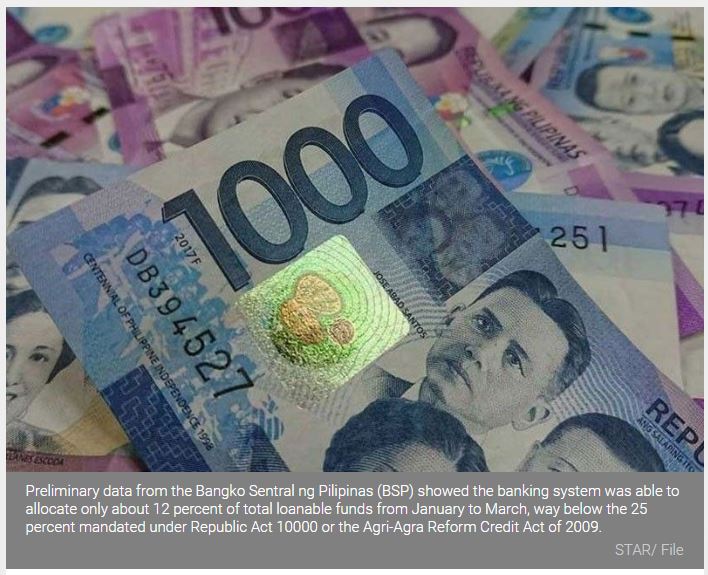Philippines: Agri-agra loans drop to P696 billion in Q1
MANILA, Philippines — Loans extended by domestic banks for agriculture and agrarian reform slipped by 2.1 percent to P696.35 billion in the first quarter from P711 billion in the same quarter last year as the industry continued to deliver the mandated threshold for the sector.
Preliminary data from the Bangko Sentral ng Pilipinas (BSP) showed the banking system was able to allocate only about 12 percent of total loanable funds from January to March, way below the 25 percent mandated under Republic Act 10000 or the Agri-Agra Reform Credit Act of 2009.
Total loanable funds generated by the banking industry increased by 17 percent to P5.81 trillion in the first quarter from P4.96 trillion in the same quarter last year.
The law retained the mandatory credit allocation in Presidential Decree 717 where 15 percent of banks’ total loanable funds are to be set aside for agriculture, while 10 percent should be made available for agrarian reform beneficiaries.
The BSP reported the loans extended by the banks to the agriculture sector amounted to P639.82 billion, equivalent to a compliance ratio of 11.02 percent. This was, however, below the required compliance ratio of 15 percent.
The central bank said big banks or universal and commercial or big banks registered a compliance ratio of 11.15 percent after extending P603.08 billion to the agriculture sector, while the ratio of thrift or mid-sized banks only reached 6.61 percent after granting P19.32 billion.
Rural banks extended P17.42 billion to the agriculture sector for a compliance ratio of 16.8 percent.
Likewise, the compliance ratio of the banking system fell way short of the 10 percent threshold for agrarian reform credit as banks only extended loans amounting to P56.53 billion for a compliance ratio of less than one percent.
The compliance ratio of big banks for agrarian reform loans only reached 0.84 percent, while that of thrift banks settled at 1.15 percent. The rural and cooperative banks reported a compliance ration of 7.36 percent.
BSP Governor Benjamin Diokno earlier said banks opted to pay P10.3 billion worth of fines to the regulator over the past decade for failing to meet the mandated agri-agra loan threshold.
“Sadly, as noted in the last few years, banks have opted to pay the 0.5 percent penalty for non-compliance, instead of providing agri-agra credit. Banks justified this based on the perceived high risk and high cost of lending to this sector,” Diokno said.
About 45 percent of the total collections are used to beef up the agriculture guarantee fund pool managed by the Land Bank of the Philippines and another 45 percent go to the Philippine Crop Insurance Corp. (PCIC) to sustain its operations.
The remaining 10 percent is left with the BSP to cover administrative costs. The BSP is committed to improving the current state of agriculture financing as the sector which employs 8.7 million Filipinos accounted for 9.8 percent of the country’s gross domestic product (GDP) and 11 percent of total imports.
“We find the present state of affairs unacceptable,” he said.
According to Diokno, a more responsive agriculture financing ecosystem is needed to realize its full potential as an engine of inclusive economic development.
Diokno supports key legislative initiatives such as the warehouse receipts bill and the amendment of the Agri-Agra Law, which aims to expand the range of eligible rural beneficiaries and agricultural activities that can be financed as part of the mandatory credit.
Source: https://www.philstar.com/business/2020/10/05/2047163/agri-agra-loans-drop-p696-billion-q1


 English
English




